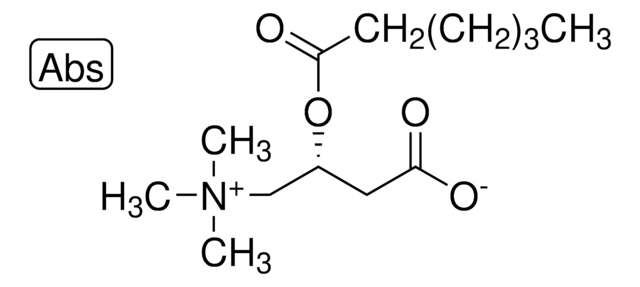07439
Hexanoyl-L-carnitine
≥97.0% (TLC)
Synonyme(s) :
(2R)-3-Carboxy-N,N,N-trimethyl-2-[(1-oxohexyl)oxy]-1-propanaminium inner salt, (R)-Caproylcarnitine, n-Hexanoyl-L-carnitine, C6-Carnitine
About This Item
Produits recommandés
Niveau de qualité
Pureté
≥97.0% (TLC)
Activité optique
[α]/D -21±2°, c = 1 in H2O
Impuretés
≤10% water
Format
neat
Température de stockage
2-8°C
Chaîne SMILES
C[N+](C)(C)C[C@H](OC(CCCCC)=O)CC([O-])=O
InChI
1S/C13H25NO4/c1-5-6-7-8-13(17)18-11(9-12(15)16)10-14(2,3)4/h11H,5-10H2,1-4H3/t11-/m1/s1
Clé InChI
VVPRQWTYSNDTEA-LLVKDONJSA-N
Vous recherchez des produits similaires ? Visite Guide de comparaison des produits
Actions biochimiques/physiologiques
Code de la classe de stockage
11 - Combustible Solids
Classe de danger pour l'eau (WGK)
WGK 3
Point d'éclair (°F)
Not applicable
Point d'éclair (°C)
Not applicable
Certificats d'analyse (COA)
Recherchez un Certificats d'analyse (COA) en saisissant le numéro de lot du produit. Les numéros de lot figurent sur l'étiquette du produit après les mots "Lot" ou "Batch".
Déjà en possession de ce produit ?
Retrouvez la documentation relative aux produits que vous avez récemment achetés dans la Bibliothèque de documents.
Les clients ont également consulté
Notre équipe de scientifiques dispose d'une expérience dans tous les secteurs de la recherche, notamment en sciences de la vie, science des matériaux, synthèse chimique, chromatographie, analyse et dans de nombreux autres domaines..
Contacter notre Service technique















